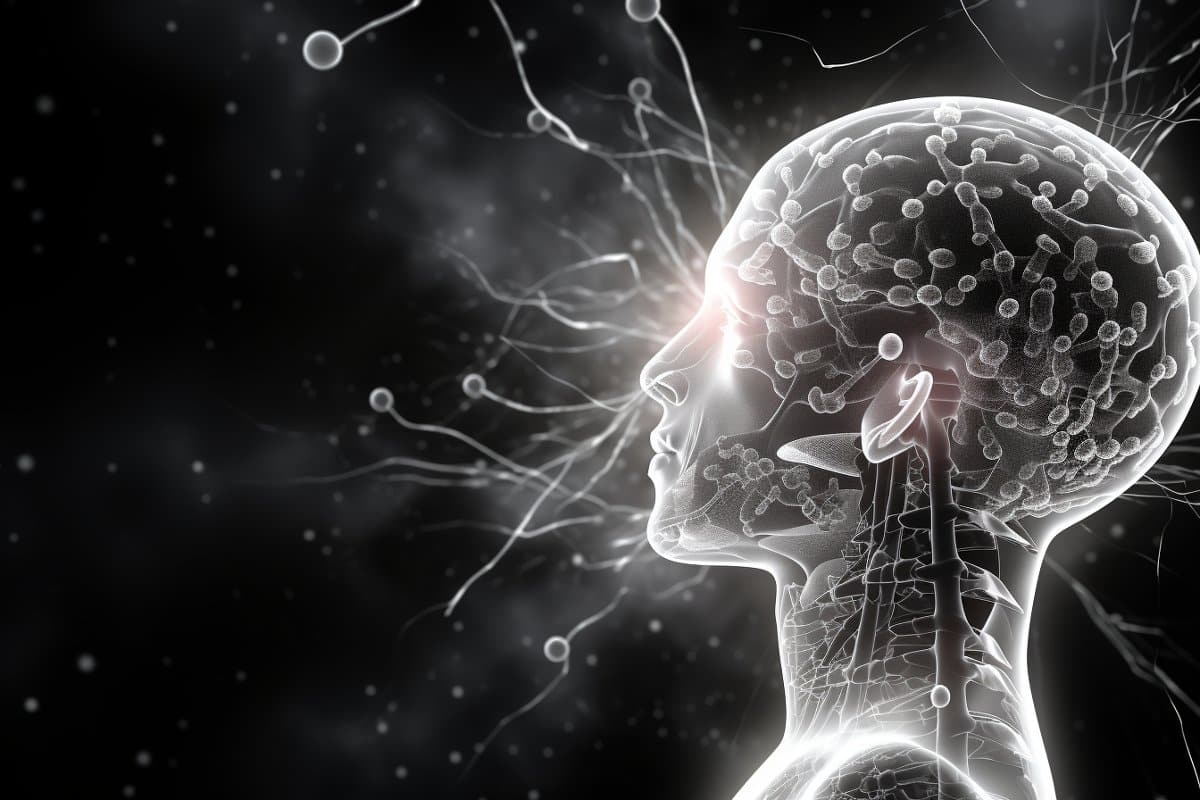Researchers have uncovered how certain tumors can prompt a severe immune response, leading to sudden-onset memory loss and cognitive deficits in cancer patients, a condition known as anti-Ma2 paraneoplastic neurological syndrome. This rare syndrome, affecting less than one in 10,000 cancer patients, stems from the immune system attacking brain proteins that resemble viral structures. The study reveals that tumors are capable of producing a protein, PNMA2, which forms virus-like complexes, prompting an immune attack. This groundbreaking research could lead to targeted treatments for the syndrome, potentially alleviating devastating neurological symptoms in affected cancer patients.Key Facts:Anti-Ma2 syndrome is a rare but serious complication where the immune system attacks brain proteins in cancer patients.The immune system targets the PNMA2 protein, which forms virus-like structures, mistaking it for a viral invader.The study’s findings open the possibility of developing treatments that could block the harmful immune response, providing relief from neurological symptoms.Source: University of UtahIn a rare but serious complication of cancer, the body’s own immune system can start attacking the brain, causing rapid-onset memory loss and cognitive deficits. What triggers this sudden biological civil war was largely unknown.Now, researchers at University of Utah Health have found that some tumors can release a protein that looks like a virus, kickstarting an out-of-control immune reaction that may damage brain cells.Their findings are published in Cell on Jan. 31, 2024.A rapid immune attackJason Shepherd, Ph.D., associate professor of neurobiology at University of Utah Health and last author on the study, explains that the swift escalation of symptoms—which can include memory and behavioral changes, loss of coordination, and even seizures—is a hallmark of the disease, called anti-Ma2 paraneoplastic neurological syndrome.  But, once activated, the immune system doesn’t just attack the PNMA2 produced by the cancer. Credit: Neuroscience NewsThe disease is one of a group of cancer-related neurological syndromes that occur in less than one in 10,000 people with cancer. The precise symptoms of these diseases vary, but all involve rapid immune reactions against the nervous system. “The symptoms come in quickly and can be quite debilitating,” Shepherd says.“This fascinating research illustrates how tumor cells can manipulate their environment,” says Neli Ulrich, Ph.D., executive director of the Comprehensive Cancer Center at Huntsman Cancer Institute at the University of Utah and a Jon M. and Karen Huntsman Presidential Professor in Cancer Research at U.“We hope that this innovative transdisciplinary research will positively impact both the lives of cancer patients and of those who experience neurological symptoms.”Stacey L. Clardy, M.D., Ph.D., a neurologist at U of U Health and a coauthor on the study, adds, “Most patients begin to experience these unusual neurologic symptoms before they even know they have a cancer.”These rapid-onset symptoms are the result of the immune system suddenly starting to target specific proteins that are found in the brain. Scientists knew that this flare of immunity often targets a protein called PNMA2. But nobody knew why PNMA2 provokes such a strong immune response, which left researchers at a loss for ways to prevent it.“We do not understand what is happening at the cellular or molecular level to actually cause the syndrome,” Clardy says, “and understanding the mechanism of disease is crucial to developing better treatments.”A virus lookalikeTo figure out how PNMA2 kickstarts an immune reaction, Junjie Xu, a graduate researcher in neurobiology at U of U Health and the lead author on the study, examined the protein’s structure using advanced microscopy.When he saw the first clear image of the protein, he was “so, so excited,” Xu says. Multiple PNMA2 proteins had spontaneously self-organized into 12-sided complexes that bore a striking resemblance to the geometric protein shells of some viruses.One of the immune system’s healthy functions is to attack viruses, and PNMA2’s virus-like structure makes it particularly prone to being targeted as well, the researchers found. In fact, in experiments in mice, the immune system only attacked PNMA2 protein when it was assembled into virus-like complexes.Wrong place, wrong timeThe location of PNMA2 in the body is also a crucial piece of the puzzle, the scientists found. “This protein normally is only expressed in the brain, in neurons,” Xu says, “but some cancer cells can express it, which can trigger an immune response.”As long as PNMA2 stays in the brain, the immune system won’t react to it. But rarely, a tumor elsewhere in the body will start producing PNMA2 protein. And when the immune system detects PNMA2 protein outside the brain, it reacts like it would to any foreign invader. The immune system makes antibodies that bind to the unfamiliar substance, and those antibodies direct immune cells to attack.But, once activated, the immune system doesn’t just attack the PNMA2 produced by the cancer. It also targets the parts of the brain that produce PNMA2 normally, including regions involved in memory, learning, and movement.The brain normally has a degree of protection from the immune system, but cancer weakens that barrier, leaving the brain especially vulnerable to this immune onslaught.In future work, the researchers aim to figure out which aspect of the immune response leads to patients’ rapid cognitive decline—the antibodies themselves, immune cells making their way into the brain, or some combination of the two.Understanding how the immune system causes neurological symptoms may help scientists design targeted treatments, Shepherd says.“If we show that PNMA2 antibodies are the culprit that really drives the neurological symptoms, you could devise a way to block those antibodies from getting into the brain or mop them up with something as a treatment… If you can alleviate some of those neurological symptoms, it really would be huge.”About this brain cancer research newsAuthor: Sophia Friesen
But, once activated, the immune system doesn’t just attack the PNMA2 produced by the cancer. Credit: Neuroscience NewsThe disease is one of a group of cancer-related neurological syndromes that occur in less than one in 10,000 people with cancer. The precise symptoms of these diseases vary, but all involve rapid immune reactions against the nervous system. “The symptoms come in quickly and can be quite debilitating,” Shepherd says.“This fascinating research illustrates how tumor cells can manipulate their environment,” says Neli Ulrich, Ph.D., executive director of the Comprehensive Cancer Center at Huntsman Cancer Institute at the University of Utah and a Jon M. and Karen Huntsman Presidential Professor in Cancer Research at U.“We hope that this innovative transdisciplinary research will positively impact both the lives of cancer patients and of those who experience neurological symptoms.”Stacey L. Clardy, M.D., Ph.D., a neurologist at U of U Health and a coauthor on the study, adds, “Most patients begin to experience these unusual neurologic symptoms before they even know they have a cancer.”These rapid-onset symptoms are the result of the immune system suddenly starting to target specific proteins that are found in the brain. Scientists knew that this flare of immunity often targets a protein called PNMA2. But nobody knew why PNMA2 provokes such a strong immune response, which left researchers at a loss for ways to prevent it.“We do not understand what is happening at the cellular or molecular level to actually cause the syndrome,” Clardy says, “and understanding the mechanism of disease is crucial to developing better treatments.”A virus lookalikeTo figure out how PNMA2 kickstarts an immune reaction, Junjie Xu, a graduate researcher in neurobiology at U of U Health and the lead author on the study, examined the protein’s structure using advanced microscopy.When he saw the first clear image of the protein, he was “so, so excited,” Xu says. Multiple PNMA2 proteins had spontaneously self-organized into 12-sided complexes that bore a striking resemblance to the geometric protein shells of some viruses.One of the immune system’s healthy functions is to attack viruses, and PNMA2’s virus-like structure makes it particularly prone to being targeted as well, the researchers found. In fact, in experiments in mice, the immune system only attacked PNMA2 protein when it was assembled into virus-like complexes.Wrong place, wrong timeThe location of PNMA2 in the body is also a crucial piece of the puzzle, the scientists found. “This protein normally is only expressed in the brain, in neurons,” Xu says, “but some cancer cells can express it, which can trigger an immune response.”As long as PNMA2 stays in the brain, the immune system won’t react to it. But rarely, a tumor elsewhere in the body will start producing PNMA2 protein. And when the immune system detects PNMA2 protein outside the brain, it reacts like it would to any foreign invader. The immune system makes antibodies that bind to the unfamiliar substance, and those antibodies direct immune cells to attack.But, once activated, the immune system doesn’t just attack the PNMA2 produced by the cancer. It also targets the parts of the brain that produce PNMA2 normally, including regions involved in memory, learning, and movement.The brain normally has a degree of protection from the immune system, but cancer weakens that barrier, leaving the brain especially vulnerable to this immune onslaught.In future work, the researchers aim to figure out which aspect of the immune response leads to patients’ rapid cognitive decline—the antibodies themselves, immune cells making their way into the brain, or some combination of the two.Understanding how the immune system causes neurological symptoms may help scientists design targeted treatments, Shepherd says.“If we show that PNMA2 antibodies are the culprit that really drives the neurological symptoms, you could devise a way to block those antibodies from getting into the brain or mop them up with something as a treatment… If you can alleviate some of those neurological symptoms, it really would be huge.”About this brain cancer research newsAuthor: Sophia Friesen
Source: University of Utah
Contact: Sophia Friesen – University of Utah
Image: The image is credited to Neuroscience NewsOriginal Research: The findings will appear in Cell
Cancer Triggers Brain Attack via Immune System Response – Neuroscience News




:max_bytes(150000):strip_icc()/GettyImages-2193435372-3ad244c57966445c990996ec3b288bf3.jpg)







